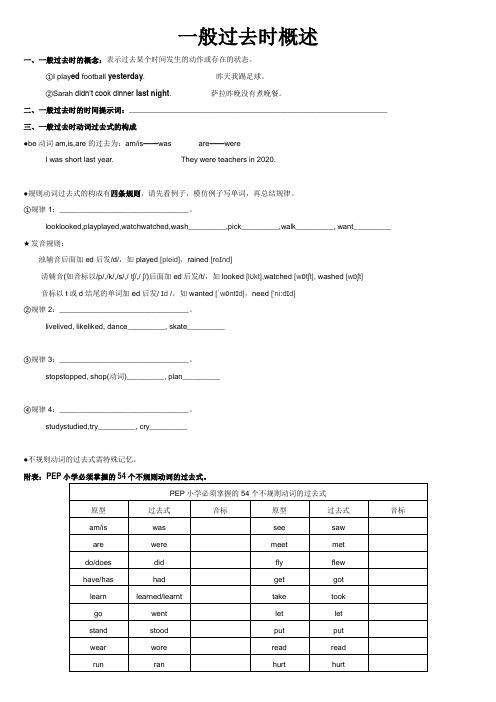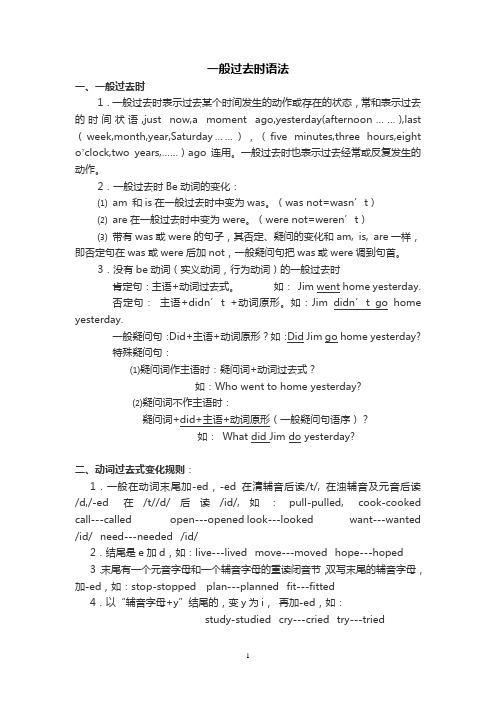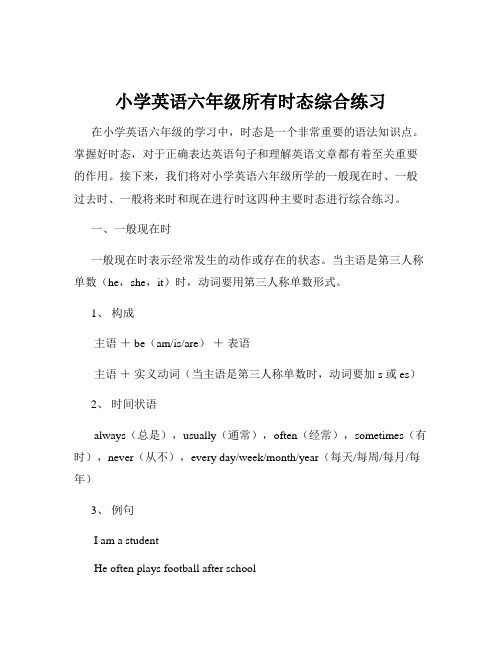六年级英语一般过去时讲解与练习
一般过去时(讲义)-人教PEP版英语六年级下册

一般过去时概述一、一般过去时的概念:表示过去某个时间发生的动作或存在的状态。
①I play ed football yesterday. 昨天我踢足球。
②Sarah didn’t cook dinner last night. 萨拉昨晚没有煮晚餐。
二、一般过去时的时间提示词:______________________________________________________________三、一般过去时动词过去式的构成●be动词am,is,are的过去为:am/is——was are——wereI was short last year. They were teachers in 2020.●规则动词过去式的构成有四条规则,请先看例子,模仿例子写单词,再总结规律。
①规律1:_______________________________。
looklooked,playplayed,watchwatched,wash_________,pick_________,walk_________, want_________ ★发音规则:浊辅音后面加ed后发/d/,如played [pleid],rained [reɪnd]清辅音(如音标以/p/,/k/,/s/,/ tʃ/,/ʃ/)后面加ed后发/t/,如looked [lʊkt],watched [wɒtʃt], washed [wɒʃt]音标以t或d结尾的单词加ed后发/ɪd /,如wanted [ˈwɒntɪd],need ['ni:dɪd]②规律2:_______________________________。
livelived, likeliked, dance_________, skate_________③规律3:_______________________________。
stopstopped, shop(动词)_________, plan_________④规律4:_______________________________。
新标准英语六年级下册一般过去时语法复习与练习

一般过去时语法一、一般过去时1.一般过去时表示过去某个时间发生的动作或存在的状态,常和表示过去的时间状语,just now,a moment ago,yesterday(afternoon……),last (week,month,year,Saturday……),(five minutes,three hours,eight o’clock,two years,……)ago连用。
一般过去时也表示过去经常或反复发生的动作。
2.一般过去时Be动词的变化:⑴ am 和is在一般过去时中变为was。
(was not=wasn’t)⑵ are在一般过去时中变为were。
(were not=weren’t)⑶带有was或were的句子,其否定、疑问的变化和am, is, are一样,即否定句在was或were后加not,一般疑问句把was或were调到句首。
3.没有be动词(实义动词,行为动词)的一般过去时肯定句:主语+动词过去式。
如: Jim went home yesterday.否定句:主语+didn’t +动词原形。
如:Jim didn’t go home yesterday.一般疑问句:Did+主语+动词原形?如:Did Jim go home yesterday?特殊疑问句:⑴疑问词作主语时:疑问词+动词过去式?如:Who went to home yesterday?⑵疑问词不作主语时:疑问词+did+主语+动词原形(一般疑问句语序)?如:What did Jim do yesterday?二、动词过去式变化规则:1.一般在动词末尾加-ed,-ed在清辅音后读/t/, 在浊辅音及元音后读/d,/-ed在/t//d/后读/id/,如:pull-pulled, cook-cooked call---called open---opened look---looked want---wanted /id/ need---needed /id/2.结尾是e加d,如:live---lived move---moved hope---hoped3.末尾有一个元音字母和一个辅音字母的重读闭音节,双写末尾的辅音字母,加-ed,如:stop-stopped plan---planned fit---fitted 4.以“辅音字母+y”结尾的,变y为i,再加-ed,如:study-studied cry---cried try---tried 以“元音字母+y”结尾的,直接加-ed,如:play-played enjoy---enjoyed5.不规则动词过去式:如am, is-was, are-were, do-did,has,have-had see-saw, say-said……等不规则动词的过去式的构成:1.把动词原形中的i改为a,变成过去式。
六年级英语一般过去时讲解与练习

六年级(Ji)英语一般过去时讲解与练习1.一般过去时表示过去某个时间发生的动作或存在的状态,常和表示过去的时间状语连用。
一般过去时也表示过去经常或反(Fan)复发生的动作。
2.Be动词在一般过去时(Shi)中的变化:⑴am 和is在一般(Ban)过去时中变为was。
(was not=wasn’t)⑵are在一般过(Guo)去时中变为were。
(were not=weren’t)⑶带有was或were的句(Ju)子,其否定、疑问的变化和is, am, are一样(Yang),即否定句在was或were后加not,一般疑问句把was或were调到句首。
3.句中没(Mei)有be动词的一般过去时的句子否定句:didn’t +动词原形,如:Jim didn’t go home yesterday. 一般疑问句:在句首加did,句子中的动词过去式变回原形。
如:Did Jim go home yesterday?特殊疑问句:⑴疑问词+did+主语+动词原形?如:What did Jim do yesterday? ⑵疑问词当主语时:疑问词+动词过去式?如:Who went to home yesterday? 动词过去式变化规则:1.一般在动词末尾加-ed,如:play-played, cook-cooked2.结尾是e加d,如:taste-tasted3.末尾只有一个元音字母和一个辅音字母的重读闭音节,应双写末尾的辅音字母,再加-ed,如:stop-stopped4.以“辅音字母+y”结尾的,变y为i,再加-ed,如:study-studied 5.小学常用不规则动词过去式:am,is-was, are-were, do-did, see-saw, say-said, give-gave, get-got, go-went, have-had, eat-ate, take-took, run-ran, sing-sang, put-put, make-made, read-read, write-wrote, draw-drew, drink-drank, fly-flew, ride-rode, speak-spoke, sweep-swept, swim-swam, sit-sat一.用be动词的适当形式填空1. We __________ students five years ago.2. Patti and I __________ good friends.3. Today __________ Tuesday, Yesterday __________ Monday.4. Sue __________ on the slide a moment ago.5. Where is my hat? It _______ on the desk just now.二.单项选择:从下列各题后所给的四个选项中选择最佳答案填空。
小学英语六年级所有时态综合练习

小学英语六年级所有时态综合练习在小学英语六年级的学习中,时态是一个非常重要的语法知识点。
掌握好时态,对于正确表达英语句子和理解英语文章都有着至关重要的作用。
接下来,我们将对小学英语六年级所学的一般现在时、一般过去时、一般将来时和现在进行时这四种主要时态进行综合练习。
一、一般现在时一般现在时表示经常发生的动作或存在的状态。
当主语是第三人称单数(he,she,it)时,动词要用第三人称单数形式。
1、构成主语+ be(am/is/are)+表语主语+实义动词(当主语是第三人称单数时,动词要加 s 或 es)2、时间状语always(总是),usually(通常),often(经常),sometimes(有时),never(从不),every day/week/month/year(每天/每周/每月/每年)3、例句I am a studentHe often plays football after schoolThey are very happy练习:1、 My father ______ (watch) TV every night2、 She ______ (like) music very much3、 The children often ______ (play) in the park二、一般过去时一般过去时表示过去发生的动作或存在的状态。
1、构成主语+ was/were +表语主语+动词的过去式2、时间状语yesterday(昨天),last week/month/year(上周/上个月/去年),ago(以前),in +过去的年份3、例句I was at home yesterdayThey played basketball last weekHe went to Beijing two years ago练习:1、 We ______ (have) a party last night2、 She ______ (buy) a new dress yesterday3、 He ______ (do) his homework an hour ago三、一般将来时一般将来时表示将来要发生的动作或存在的状态。
小升初语法辨析一般现在时一般过去时一般将来时(讲义)人教PEP版英语六年级下册

小升初英语语法辨析:一般现在时、一般过去时、一般将来时&专项模拟练习一、一般现在时1.定义:表示经常发生的动作、存在的状态或普遍真理。
2.时间标志词:often(经常)、usually(通常)、always(总是)、sometimes(有时)、every day/week/month/year(每天/ 周/ 月/ 年)等。
3.结构:1.主语(非第三人称单数)+ 动词原形。
例如:You play basketball afterschool.(你放学后打篮球。
)2.主语(第三人称单数)+ 动词的第三人称单数形式。
例如:He playsbasketball after school.(他放学后打篮球。
)4.用法:1.表示经常性或习惯性的动作。
如:I go to school by bike every day.(我每天骑自行车去上学。
)2.表示现在的状态或特征。
如:She is tall and thin.(她又高又瘦。
)3.表示客观事实或普遍真理。
如:The earth moves around the sun.(地球绕着太阳转。
)二、一般过去时1.定义:表示过去某个时间发生的动作或存在的状态。
2.时间标志词:yesterday(昨天)、last week/month/year(上周/ 上个月/ 去年)、ago(……以前)、in + 过去的年份等。
3.结构:主语+ 动词的过去式。
例如:You played basketball yesterday.(你昨天打了篮球。
)4.用法:1.表示过去某个时间发生的动作。
如:I went to the park last Sunday.(我上周日去了公园。
)2.表示过去存在的状态。
如:He was happy yesterday.(他昨天很开心。
)三、一般将来时1.定义:表示将来某个时间要发生的动作或存在的状态。
2.时间标志词:tomorrow(明天)、next week/month/year(下周/ 下个月/ 明年)、in the future(在未来)等。
六年级上册英语-一般过去时讲义知识点 练习 沪教牛津版

一般过去时概念:一般过去时表示过去某个时间发生的动作或存在的状态,常和表示过去的时间状语连用。
一般过去时也表示过去经常或反复发生的动作。
重点:一般过去时态概念、用法及动词过去式变化规则难点:一般过去时的句子如何变为一般疑问句和特殊疑问句Be动词的一般过去时态变化⑴am 和is在一般过去时中变为was。
(was not=wasn’t)⑵are在一般过去时中变为were。
(were not=weren’t)⑶带有was或were的句子,其否定、疑问的变化和is, am, are一样,即否定句在was或were 后加not,一般疑问句把was或were调到句首。
句中没有be动词的一般过去时的句子肯定句:动词用一般过去时态,如:Jim went home yesterday.否定句:didn’t +动词原形,如:Jim didn’t go home yesterday.一般疑问句:在句首加did,句子中的动词过去式变回原形。
如:Did Jim go home yesterday?特殊疑问句:(1)疑问词+did+主语+动词原形?如:What did Jim do yesterday?Where did Jim go yesterday?⑵疑问词当主语时:疑问词+动词过去式?如:Who went home yesterday?动词过去式变化规则1.一般在动词末尾加-ed,如:pull-pulled, cook-cooked2.以e结尾的动词,直接加-d,如:taste-tasted3.以重读闭音节(即:辅音+元音+辅音)结尾且末尾只有一个元音字母和一个辅音字母的动词,双写末尾的辅音字母,再加-ed,如:stop-stopped4.以“辅音字母+y”结尾的,变y为i,再加-ed,如:study-studied5.不规则动词过去式:am,is-was,are-were, do-did, see-saw, say-said, give-gave,get-got, go-went, come-came, have-had, eat-ate,take-took, run-ran, sing-sang, put-put, make-made,read-read, write-wrote, draw-drew, drink-drank, fly-flew, ride-rode, speak-spoke, sweep-swept, swim-swam, sit-sat一.过去时练习。
(完整版)六年级英语一般过去时练习题及答案讲解
一般过去时练习题及答案讲解一:用所给动词的适当形式填空1.Tom and Mary ___________ (come) to China last month.2.Mike _________________(not go) to bed until 12 o’clock last night. SoI _______ (get ) up late.3.Mary __________ (read) English yesterday morning.4.There _________ (be) no one here a moment ago.5.I ___________ (call) Mike this morning.6.I listened but ___________ (hear) nothing.7.Tom ___________ (begin) to learn Chinese last year.st week we _________ (pick) many apples on the farm.9.My mother ________________ (not do) housework yesterday.10.She watches TV every evening. But she _______________ (not watch) TV last night.11.________ your father ________ ( go ) to work every day last year?12. —What time _______ you _______ (get) to Beijing yesterday?—We __________ (get) to Beijing at 9:00 in the evening.13.What __________ (make) him cry (哭) just now?st year the teacher ___________ (tell) us that the earth moves around the sun.15.There ____________ a telephone call for you just now. (be)16.There __________ not enough people to pick apples that day. ( be)17.There _____________ any hospitals (医院) in my hometown (家乡) in 1940. ( be not)18.There ____________ enough milk at home last week, wasn’t there?19.Eli ____________ to Japan last week. ( move)20. –When _______ you _________ (come) to China? - Last year.21.Did she ________ (have) supper at home?22.Jack ____________ (not clean) the room just now.23._________ (be) it cold in your city yesterday?24.How many people ________ (be) there in your class last term?25.It ________ (be) hot yesterday and most children _______ (be) outside.26. There ________ (be) a football match on TV yesterday evening, but I _________ (have) no time to watch it.27. He ate some bread and _________ (drink) some milk.28. ________ he __________ (finish) his homework last night?29. I__________(be) tired yesterday.30. I ___________(gain ) Arts degree last year.31. What _________ you ___________ (do) last night?32. My grandfather _________ (leave) Hong Kong for New York in 1998.33. What _______ he ________ (do) yesterday?34. Last week I _______ (buy) a new bike.35. He ________ (be) here just now.36. He __________ (not find ) his key last night.37. My father __________ (drink) a lot of wine yesterday.38. ________ you ________ (finish) your homework yesterday?39. I ________ (eat) some eggs and bread this morning.40. Her mother __________ (not give) the girl any present.二、改错题1.How is Jane yesterday? _____________________2.He go to school by bus last week. ____________________________ 3.He often goes home at 6:00 last month. ____________________________4.I can fly kites seven years ago. ______________________________ 5.Did you saw him just now. ____________________________________6.Tom wasn’t watch TV last night. ____________________________________7.I didn’t my homework yesterday. ____________________________________8.He wait for you three hours ago. ____________________________________9.Who find it just now ? ________________________________________三、按要求变换句型。
牛津译林版英语六年级下册期末知识点复习(一般过去时和一般将来时)附练习含答案
六年级下学期知识点预习【重点语法:一般过去时和一般将来时】一般过去时一.时态含义:表示过去某个时间发生的动作。
二.时态标志:yesterday昨天,last week/year…上周/去年…(last上一个),just now刚才,this morning/afternoon,…ago等四种时间状语①yesterday及相关短语。
例如:yesterday morning/afternoon/evening昨天上午/下午/晚上②“last+时间状语”构成的短语。
例如:last night/month/spring/year昨晚/上个月/去年春天/去年③“一段时间+ago”组成的短语。
例如:three days ago三天以前four years ago四年以前④“介词+时间名词”组成的短语。
例如:in1999在1999年on the morning of December25th在12月25号早上三.动词过去式动词在过去时态中,要由原形变化成为过去式,其变化规则为以下几种(1)be动词am/is--was are--were(2)直接在动词后面加ed laugh--laughed point--pointed(3)以不发音的e结尾的加d like--liked live--lived(4)以辅音+y结尾的try--tried cry--cried要去掉y改成i加ed carry--carried(5)以元音+y结尾的加ed play--played stay--stayed(6)有些动词要双写最后一个字母,再加ed stop—stopped jog—jogged(7)不规则变化(为过去时态中变化的难点,也是考试的重点)原形过去式原形过去式原形过去式do did go went say saidtell told can could get got have had give gave see saw become became fly flew bring brought eat ate take took find found lose lost stop stopped sing sang make made run ran swim swam hold held come came catch caught wear wore read read draw drew write wrote buy bought mean meant drink drank smell smelt keep kept put put throw threw slip slipped feel felt cut cut drive drove四.结构1.肯定句:主语+动词过去式2.一般疑问句:(1)句中含有be动词,将be动词提到句首,Was/Were+主语+……?Yes,…was/were./No,…wasn’t/weren’t.(2)句中无be动词,在句首加Did,动词变原形,Did+主语+动词原形……?Yes,…did./No,…didn’t.3.否定句的修改方法(1)句中含有be动词,直接在be动词后面加not,主语+wasn’t/weren’t…(2)句中无be动词,在动词前加didn’t,动词变原形,主语+didn’t+动词原形4.特殊疑问句:What did+主语+do?一般过去时练习一、请用正确动词形式填空。
人教版小学六年级英语各时态结构总结及练习题(cy)
一、一般过去时的结构1一般过去时的基本用法一般过去时表示过去某个时间发生的动作或存在的状态,也可表示过去经常或反复发的动作。
常和表示过去的时间状语连用,如y esterday, last week, last night, in 2003, two days ago等。
【举例】I got up at 6:30 yesterday.我昨天6:30起床。
My father was very busy last week.我父亲上周很忙。
2.一般过去时的基本结构⑴肯定句“主语+动词过去式+其他”或者“主语+was/were+其他”。
【举例】I played tennis last weekend.我上周末打网球了。
My school trip was great.我的学校郊游棒极了。
⑵否定句“主语+didnt+动词原形+其他”或“主语+wasn’t/were n’t+其他”。
【举例】The girl didn’t play computer games yesterday afternoon.这个女孩昨天下午没玩电子游戏。
Old Henry wasn’t happy last Friday.上星期五老亨利不高兴。
⑶一般疑问句“Did+主语+动词原形+其他?”肯定回答为“Yes,主语+did”,否定回答为“No,主语+didn’t”或者“Was/Were+主语+其他?”肯定回答为“Yes,主语+was/were”,否定回答为“No,主语+wasn’t/were n’t”。
【举例】— Did you go to the beach?你们去海滩了吗?—Yes, we did./No, we did n’t.是的,我们去了。
/不,我们没有。
—Was your weekend OK?你的周末过得还行吧?— Yes, it was./No, it wasn’t.是的,还行。
/不,不行。
⑷特殊疑问句:特殊疑问词+一般疑问句(顺序)?【举例】—What did Li Lei do last weekend?李雷上周末干什么了?—He visited his grandparents.他去看了他的祖父母。
(完整)六年级一般过去时练习题参考答案
六年级一般过去时练习题参考答案一一般过去时的定义一般过去时表示过去某一时候或某一段时间所发生了的事情或存在的状态。
常与过去时间yesterday, this morning, just now, a moment ago, in May, last night / year / week, once upon a time, the other day, before …, when – clause, in the past连用。
如:What did you do yesterday? 昨天你干了什么?I met Lin Tao this morning. 今天上午我会到了林涛。
I was there a moment ago. 刚才我在那儿二、用法说明1表示在过去某个时间所发生的动作或所处的状态。
常与yesterday, last week, in 1989, just now, a moment ago, the other day等连用。
如:He was here just now. 他刚才还在这里。
What did you do yesterday? 你昨天做了什么事?2在过去一段时间内的经常性或习惯性动作。
如:We often played together when we were children. 我们小时候常在一起玩。
注:表示过去经常发生的动作还可用used to 和would。
如:He used to smoke a lot, but he doesn’t now. 他过去经常抽烟,但现在不抽了。
Whenever we were in trouble, he would help us. 每当我们遇到困难,他都会帮助我们。
3表示主语过去的特征或性格。
如:At that time she was very good at English. 那时她英语学得很好。
4用在状语从句中表示过去将来。
- 1、下载文档前请自行甄别文档内容的完整性,平台不提供额外的编辑、内容补充、找答案等附加服务。
- 2、"仅部分预览"的文档,不可在线预览部分如存在完整性等问题,可反馈申请退款(可完整预览的文档不适用该条件!)。
- 3、如文档侵犯您的权益,请联系客服反馈,我们会尽快为您处理(人工客服工作时间:9:00-18:30)。
worry___
ask ___
__ taste
eat___
_ draw___
put ___
__ throw
kick
pass_
_ do
五、请用正确动词形式填空。
1.I(have) an exciting party last weekend.
2.---she(practice) her guitar yesterday?---No, sh
一.用be动词的适当形式填空
1.Westudents five years ago.
2.Patti and Igood friends.
3.TodayTuesday, YesterdayMonday.
4.Sueon the slide a moment ago.
5.Where is my hat? Iton the desk just now.
否定句:一般
疑问句:肯、否定
回答:
七、翻译下列句子
1.我过了一个忙碌但却刺激的周末。
Iexciting weekend.
2.Jenny喜欢看书。昨晚她看了一本英语书。
Jenny likes.Shean English
book last night.
3.Emma每天都看电视。可是昨天他没有看。
EmmaTV every day. But he
⑶带有was或were的句子,其否定、疑问的变化和is, am, are一羊,即否定句在was或were后加not,—般疑问句把was或were调到句首。
3.句中没有be动词的一般过去时的句子
否定句:didn't+动词原形,如:Jim didn't go home yesterday.一 般疑问句:在句首加did,句子中的动词过去式变回原形。 如:Did Jim go home yesterday?
She(stay) at home and(do) some cleaning.
6.句型转换1. It was exciting.
否定句:一般
疑问句:肯、否定
回答:
2.All the students were very excited.
否定句:一般
疑问句:肯、否定
回答:
3.They were in his pocket.
二.单项选择: 从下列各题后所给的四个选项中选择最佳答案填 空。
()1.My father__—_—_
ill yesterday.A.isn't B.aren'tC.wasn't D.weren't
()2.______
your parents at home last wee?k A.IsB.WasC.Are D.
否定句:一般
疑问句:肯、否定
回答:
4.Su Hai took some photos at the Sports day.
否定句:一般
疑问句:肯、否定
回答:
5.Nancy went to school early.
否定句:一般
疑问句:肯、否定
回答:
6.We sang some English songs.
()5 —
_.A.I am B.I was C. Yes, I wasD. No, I was n't
四.写出下列动词的过去式
is\am
fly
__ plant
___ are
___ drink___
_ play
___ go
__ make
Were
()3.The twinsin Dalian last year They___
___here now.
A.are; were B.were; are C.was; are D.were; was
()4.your father at work the dayesterday前
天)?
A.Was; before B.Is; before C.Was; after D.Is; after
特殊疑问句:⑴疑问词+did+主语+动词原形?
如:What did Jim do yesterday⑵疑问词当主语时:疑问词+动词过去
式?
如:Who went to home yesterday动词过去式变化规则:
1.一般在动词末尾加-ed,如:play-played, cook-cooked
2.结尾是e加d,如:taste-tasted
yesterday.
4.上 周 六 他 们 做 什 么 了 ? 他 们 做 作 业 和 购 物
了。WhattheySaturday? They
般过去时讲解与练习
1.一般过去时表示过去某个时间发生的动作或存在的状态,常和表 示过去的时间状语连用。 一般过去时也表示过去经常或反复发生的动 作。
2.Be动词在一般过去时中的变化:
⑴am和is在一般过去时中变为was(was not=wasn t)
⑵are在一般过去时中变为weres(were not=weren t)
e.
3.---WhatTom(do) on Saturday evening? ---He
(watch) TV and(read) an interesting book.
4.They all(go) to the mountains yesterday morning.
5.She(not visit) her aunt last weekend.
3.末尾只有一个元音字母和一个辅音字母的重读闭音节,应双写末尾的辅音字母,再加-ed,如:stop-stopped
4.以“辅音字母+y”结尾的,变y为i,再加-ed,女口:study-studied5小学常用不规则动词过去式:
am,is-was, are-were, do-did, see-saw, say-said, give-gave, get-got, go-went, c ome-came, have-had, eat-ate, take-took, run-ran, sing-sang, put-put, make-m ade, read-read, write-wrote, draw-drew, drink-drank, fly-flew, ride-rode, spea k-spoke, sweep-swept, swim-swam, sit-sat
